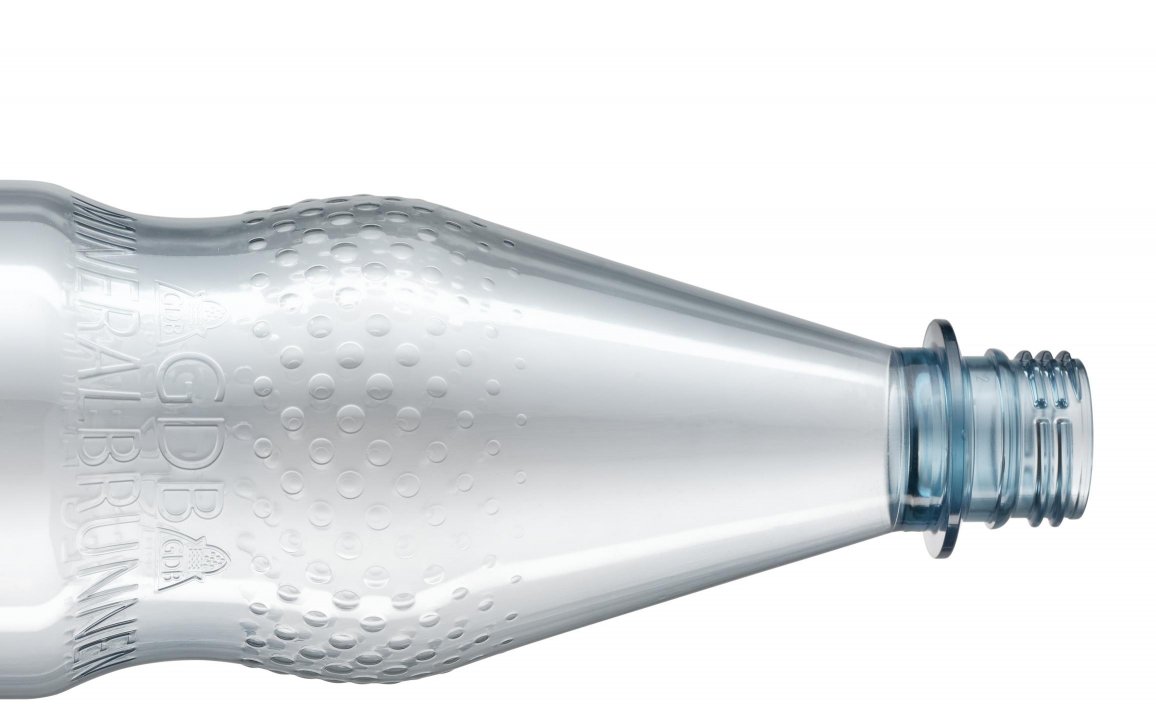Reusable PET bottles for mineral water
ALPLA produces the PET ‘pearl bottle’ for Genossenschaft Deutscher Brunnen – life cycle assessment confirms sustainability of this packaging solution.
It’s considered a design classic in Germany and has won numerous awards since it was introduced in 1969. And it’s said that virtually every German citizen has held one in their hands at some point. We’re talking about what's commonly known as the ‘pearl bottle’ for mineral water, which is made by Genossenschaft Deutscher Brunnen. This cooperative has been one of ALPLA’s customers in Germany since June 2020. The global expert in innovative plastic packaging produces the reusable PET bottle and the preforms needed for this at its site in Vlotho-Exter.

Pool system for water bottles
Genossenschaft Deutscher Brunnen e.G. (GDB) is a purchasing cooperative with approximately 180 members. It accounts for a good third of total sales in the market of German mineral water producers. GDB provides mineral water producers with everything they need for their operations and organises reusables pools that currently comprise more than a billion bottles and 100 million crates. Within these, there are approximately equal quantities of reusable PET and reusable glass bottles.
This pool management is not only a central service of GDB for its members – it also engenders significant benefits for the consumers and for the environment. Within the pool system, various bottling companies all over Germany use the same bottles and crates. This means the consumers can take empty bottles back to virtually any supermarket. It also reduces the amount of bottle sorting that the retail partners have to do. The supermarkets then return the empties to the nearest bottling company, where they are washed and refilled. Compared with stand-alone reusables systems, the pool system cuts transport distances, reduces the number of lorries on the roads and lowers carbon emissions.
Life cycle assessments of reusable packaging units
Anyone who has been following the latest discussions surrounding the topic of climate change will know that transport and mobility in general are important levers for achieving climate targets. The pool systems mentioned above are the reason why these bottles are considered more environmentally friendly than the individual reusable bottles of different bottling companies. But what environmental impact do PET bottles have exactly?
To find out, ALPLA commissioned the independent consultancy company c7-consult with producing a life cycle assessment of mineral water bottles made of PET and glass in Germany in November 2019 in line with ISO 14044. This analysis considers the environmental impacts of 13 different packaging units for mineral water in two sales models, namely local and nationwide distribution. The life cycle assessment delivered the following results:
- The higher the proportion of recyclates in PET bottles, the lower the environmental impacts of the packaging. This is obviously the case both for single-use and reusable solutions.
- GDB’s reusable PET bottles perform the best across all the different environmental impacts. Being pool bottles, they benefit from covering the shortest return distances as they can be returned to and refilled by any of the cooperative’s members.
- Reusable PET bottles always perform better than reusable glass bottles.
- The lower the weight of the packaging in relation to its filling volume, the lower the environmental impacts.
A life cycle assessment for packaging in Austria which c7-consult and ALPLA presented in Vienna back in April 2019 delivered very similar results. Here, too, the reusable PET bottle made entirely of recycled materials came out on top by having the lowest environmental impacts. In comparison, single-use glass bottles were ranked bottom in the study, as they have the greatest environmental impacts.
In view of this, ALPLA is especially delighted to have secured GDB as a customer and therefore to have been awarded the first significant reusables contract in Germany.
Increasing the proportion of recyclates in reusable packaging too
Our aim is to offer the best and most sustainable packaging solution for each product and market, and to then continue to improve them. For example, we have increased the proportion of recyclates in reusable PET bottles from 10 per cent to as much as 30 per cent. We can envisage a self-contained recycling cycle for reusable PET bottles or for these bottles’ caps in the future. In this area, ALPLA boasts expertise not only as a producer of bottles and caps, but also as a recycler.
We will conclude with some clarification regarding the frequently discussed topic of the ‘refill rates’ of reusable packaging units. The bottles manufactured in Vlotho-Exter are required to last for at least 15 trips, with a figure of 25 being a realistic assumption to make. And even when a bottle is withdrawn at the end of its life cycle, it can be recycled and the material can be turned into new packaging units, including reusable PET bottles.
Do you like our texts? Perhaps even so much that you want to use them in your own media? Then please get in touch with us beforehand!
